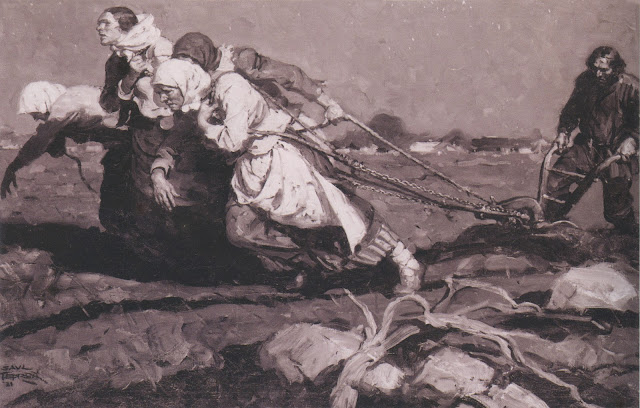 |
| James Dougherty |
Lou Reed recalled the time Andy Warhol scolded him for not working hard enough:
No matter what I did it never seemed enough.He said I was lazy, I said that I was young.He said, "how many songs did you write?"I'd written zero, I'd lied and said "ten.""You won't be young forever.You should have written fifteen."
When Reed explained he was uncertain what to write, Warhol brushed him off.
You think too much.
It's work. The most important thing is work.
Milton Glaser was a different type of artist, but agreed on the importance of work. In fact, he urged that we abandon the word "art" and replace it with the word "work." Calling it work, like every other type of honest labor, would not only "restore art to a central, useful activity in daily life" but would also eliminate anxiety for everyone who is obsessing about whether they are artists or not.
 |
| Saul Tepper |
Before the era of video games, civilizations that valued hard work and disparaged slackers were often rewarded with great art. The Italian Renaissance and the golden age of Greece were two such periods; those cultures faced political strife, religious violence, civil uncertainty and military threats as great as ours yet their artists accomplished great things without electric lights or air conditioning.
The Stuart period in England (1603 - 1714), a culture which shamed idleness, produced Shakespeare, Ben Jonson, John Donne, and Herbert, followed by Milton's Paradise Lost and Bunyan's Pilgrim's Progress, before ending the century with Alexander Pope, Daniel Defoe and Jonathan Swift. It became the cultural home of great painters such as Rubens and Van Dyck. While this was going on, Isaac Newton was transforming human understanding of the universe, Francis Bacon was inventing the modern scientific method and William Harvey was discovering the circulation of the blood. Newspapers were invented and indolent minds which for centuries had dwelt on witchcraft and superstition were challenged. Great architects such as Christopher Wren and Inigo Jones flourished. What a fruitful century!
Of course, not all work pays the same dividends. A lot of what passes for artistic effort today doesn't seem directed at enhancing the quality of the work.
- During the last century, fine art became more fixated on pure self-expression. Illustration, which involved purposeful work in the empirical world, was demoted to a lower spiritual plane. But as Glaser wrote, "The dissociation of art from other human activities has impoverished our lives." He noted, "Michelangelo didn't paint the last judgment to express himself. He painted it because the Pope wanted to scare the bejeesus out of the congregation." The type of "work" involved in pure self-expression primarily involves emoting-- which can be difficult to distinguish from laziness. That's why it helps if fine artists can establish their bona fides with suicide, addiction or emotional incapacity.
- A second type of effort which preoccupies many of today's artists is self-promotion. Artists such as Hirst and Koons have become sensationalists, achieving fame by causing commotions. This is the work involved in smashing plates and gluing them to a great big canvas. While there seems to be no artistic growth or edification from this type of labor, the financial growth can be considerable.
- Perhaps the most slippery and inimical challenge of all is the work currently outsourced to labor-saving software such as ChatGPT and its progeny. "Effortless" art presumes that there was nothing to be gained from the effort. This assumption may resonate easily with a culture centered around "labor saving" kitchen appliances, but it's not clear that art functions the same way. Previous civilizations that were less afraid of hard work would be wary of "easy art." If ChatGPT had spared Michelangelo's four years of hard labor painting the Sistine Chapel, how would that have affected the outcome?
 |
| John Cuneo |
The type of "work" that goes into creating what we now call art has become increasingly wobbly. At the same time, much of the art turns out to be increasingly minor compared to what past civilizations have produced. Are the two trends related? It's too early to say.
